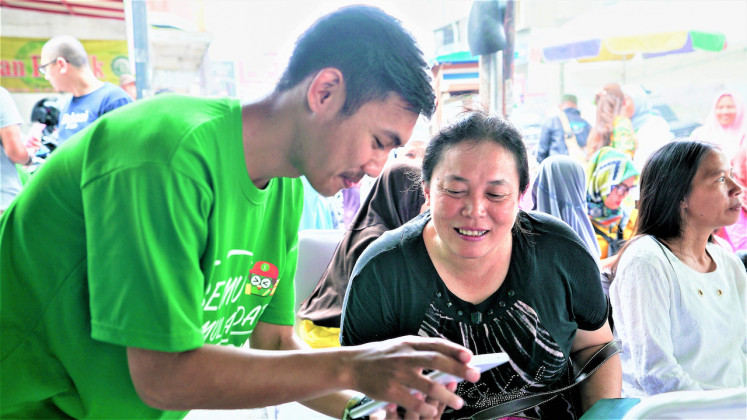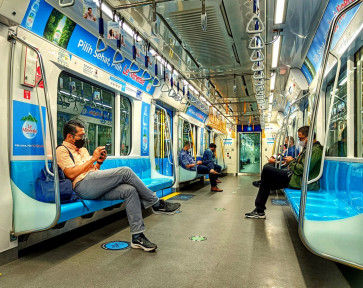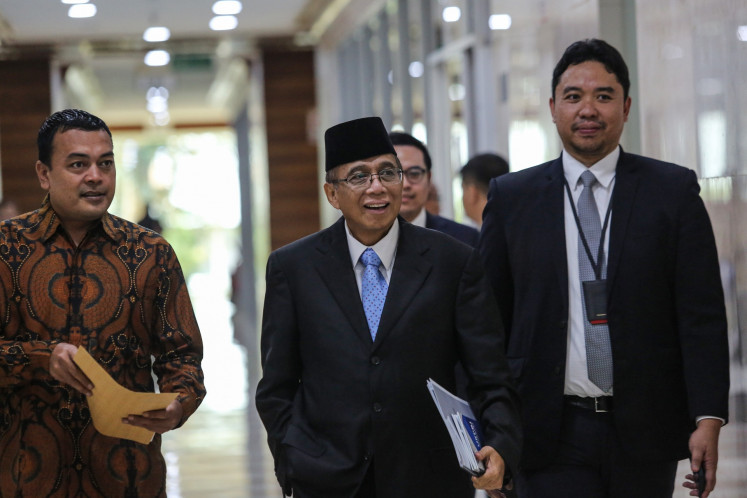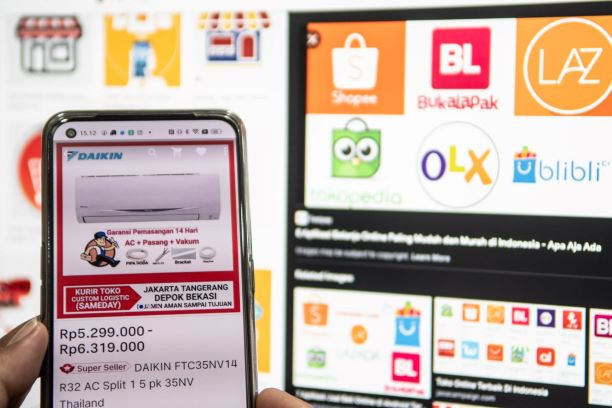Popular Reads
Top Results
Can't find what you're looking for?
View all search resultsPopular Reads
Top Results
Can't find what you're looking for?
View all search resultsAccelerating MSMEs’ digital transformation supports RI economy
Embracing digital transformation has become a prerequisite for strengthening MSMEs to enable them to bolster economic resilience amid the global health and economic crisis.
Change text size
Gift Premium Articles
to Anyone
 Tokopedia has recently made fulfillment centers available in five different cities in Indonesia, namely Jakarta, Bandung, Surabaya, Makassar, Palembang, and Tokopedia data shows that in the second quarter of 2020, consumer demand for MSME products sold through local fulfillment centers was 2.5 times greater than the demand in the first quarter of the same year. (Courtesy of/Tokopedia)
Tokopedia has recently made fulfillment centers available in five different cities in Indonesia, namely Jakarta, Bandung, Surabaya, Makassar, Palembang, and Tokopedia data shows that in the second quarter of 2020, consumer demand for MSME products sold through local fulfillment centers was 2.5 times greater than the demand in the first quarter of the same year. (Courtesy of/Tokopedia)
I
ndonesia’s micro, small and medium enterprises (MSMEs), which account for 60 percent of the national gross domestic product (GDP) and 97 percent of the domestic workforce, play a crucial role in protecting Indonesia’s economic resilience, especially during the COVID-19 pandemic.
Embracing digital transformation has become a prerequisite for strengthening MSMEs to enable them to bolster economic resilience amid the global health and economic crisis.
According to a recent survey by the Mandiri Institute, digitalized MSMEs could help reduce 1.5 percent of the economic burden on Indonesia’s GDP caused by the COVID-19 pandemic.
In that context, the COVID-19 pandemic seems to have accelerated the digitalization of Indonesian MSMEs, most of which have found they have no choice but to conduct their business online amid the social restrictions put in place to prevent the spread of the virus.
Of Indonesia’s more than 60 million MSMEs, only 13 percent went digital in 2019.
But as the pandemic has given most consumers no choice but to do most of their shopping online, Coordinating Economic Minister Airlangga Hartarto said a significant number of local MSMEs had moved their businesses online to stay abreast of the changes.
Between May 14 and June 9, about 301,115 MSMEs digitalized their businesses, according to Airlangga.
Official data on the percentage of MSMEs that have gone digital in Indonesia as a result of the COVID-19 pandemic is not yet available.
Nonetheless, an economist from the Institute for Development of Economics and Finance’s (Indef) Center of Innovation and Digital Economy, Nailul Huda, estimated that the unforeseen acceleration brought about by the pandemic had boosted the percentage of MSMEs that had gone online to about 15 to 20 percent this year.
However, simply going online, according to Huda, is not enough to ensure that Indonesian MSMEs survive these tough times.
“These MSMEs have to be able to gauge precisely the consumer demands for the products they sell in a particular region or city. For instance, are salty snacks still in demand in this city right now? Because it doesn’t make sense to keep on producing when there is no demand for such products there,” Huda told The Jakarta Post on Oct. 1.
He highlighted the importance of market insight to help guide MSMEs conducting their business online as consumer demand had been in decline amid the financial contraction brought about by COVID-19.
“During the pandemic, most consumers instate spending austerity measures, except when it comes to their primary needs,” he said, citing data from Statistics Indonesia that food prices recorded an annual deflation of 1.09 amid the pandemic.
He added that proper market insight could help MSMEs resume their operations and prevent laying off too many workers.
Fortunately, some marketplace platforms in Indonesia have already recognized the importance of sharing their real-time, data-driven market insights with their MSME merchant partners to help the latter thrive, even before the pandemic occurred.
Tokopedia Vice President of Corporate Communications Nuraini Razak said that since 2019, the marketplace platform had been offering market insight to its MSME merchant partners that wished to expand their operations beyond their region of origin.
“Let’s say you’ve been successfully selling the Acehnese sale pisang (banana snacks) in your hometown in Aceh all these years and you’re considering opening your business in Makassar, South Sulawesi and Bandung, West Java,” she said.
“Typically, you’d have to move to these cities, rent a shop or house and when it turns out that no buyer is interested in your snacks, you’ll have to cease operations and suffer some business losses,” she told the Post in a Google Meet interview.
She said that by tapping into its pool of consumer behavior data to provide merchants clear market insight, Tokopedia helped these MSME merchants avoid these inefficiencies.
“For instance, [say] it turns out that demands for your banana snacks is highest in Bandung, followed by Makassar. You don’t even have to physically move to those cities and rent a big shop or house for your business. You can simply supply these items to Tokopedia’s fulfillment centers in each city for them to distribute the snacks locally,” she said.
Tokopedia had committed to opening fulfillment centers throughout Indonesia to strengthen the presence of local products by local MSMEs before these products could eventually gain global recognition. (Courtesy of/Tokopedia)The market insight also allows you to simply produce and supply your products to each fulfillment center (locally known as TokoCabang) in accordance with the exact level of consumer demand there.
“For instance, you can send 5,000 packages to Bandung since it has the biggest consumer base for you, while for Makassar, you can only send 500,” she said.
Embracing digital transformation has become a prerequisite for strengthening MSMEs to enable them to bolster economic resilience amid the global health and economic crisis. Then, workers in each fulfillment center handle the order, packaging, and delivery of the items to the courier.
“Thanks to this system, you don’t have to spend dozens of million rupiah to rent a space in a shop or house. You just need to consign your products to TokoCabang and only get charged Rp 3,000 per product sold. The maintenance of products will be free for the first 60 days, and then you’ll only be charged Rp 2,000 per item per month subsequently.”
According to Nuraini, Tokopedia has recently made fulfillment centers available in five different cities in Indonesia, namely Jakarta, Bandung, Surabaya, Makassar, Palembang. and Medan.
“We’ve decided to set up the centers in these five cities considering the high demand observed for MSME products there,” she said.
Tokopedia data shows that in the second quarter of 2020, consumer demand for MSME products sold through local fulfillment centers was 2.5 times greater than the demand in the first quarter of the same year.
Apparently, Indonesian consumers’ shift to online shopping amid pandemic-induced restrictions has boosted the demand for local products manufactured by Indonesian MSMEs through Tokopedia.
Nuraini said the solution was inspired by Tokopedia founder and chief executive officer William Tanuwijaya’s commitment to close the economic gap between Indonesia’s big and small cities, informed by his own experience growing up in the small town of Siantar in North Sumatra.
“His observation of the realities of his hometown made him aware that, ideally, people would not need to migrate to big cities to make it big with their businesses. Besides helping to address overpopulation in big cities, this can also help cut the distribution inefficiencies in Indonesia, which inflate prices of some products once they’re shipped to remote areas,” she explained.
She went on to say that Tokopedia had committed to opening fulfillment centers throughout Indonesia to strengthen the presence of local products by local MSMEs before these products could eventually gain global recognition.
Nuraini said another initiative taken by the company to help MSMEs improve were its e-commerce education programs through online classes for people who had never started an online business or who were already selling on Tokopedia.
Through these online classes, Tokopedia provides educational materials on how to open an online store, tips on getting first orders, explorations of the benefits of selling online, information about creating interesting promos and more.
Huda said that e-commerce platforms’ efforts to support MSMEs needed to be appreciated. Yet, various stakeholders need to do some homework to help MSMEs thrive.
“The acceleration of MSME digitalization is greatly affected by the availability of infrastructure, which will lead us to talking about digital gaps among different Indonesian regions, which, in fact, have worsened social discrepancies. Only places with proper internet facilities, ATMs and goods distribution companies can sustain MSME digitalization,” he said.
He also mentioned that Indonesian MSMEs were in dire need of proper funding.
“Therefore, when we talk about digitalization, we also need to talk about whether MSMEs that have gone online have had access to banking and financial inclusion,” he noted.
“Then, another classic issue is the availability of proper packaging to preserve the MSMEs’ food products much longer through an airtight system,” he said.











